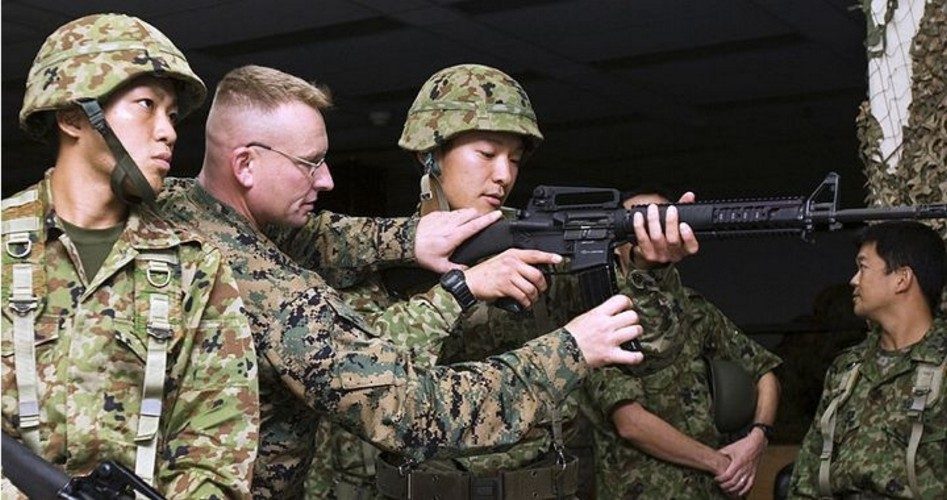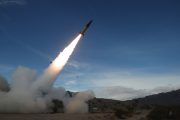
The United States’ military presence on the Japanese island of Okinawa, which has existed since the U.S. occupation of the Ryukyu Islands (of which Okinawa is part) at the end of World War II, has spawned on-and-off protests from local residents since 1995. In that year, the U.S. and Japanese governments agreed to relocate some U.S. troops outside Okinawa and move others to less populated parts of the island after three U.S. servicemen kidnapped and raped a Japanese schoolgirl. The offenders were handed over by the military to Japanese authorities and tried and convicted under Japanese law.
Following that incident, Japan and the United States approved a plan to relocate a Marine Corps air station to a less-populated part of Okinawa and hand over a 10,000-acre tract of former military land to Japan. But that relocation and transfer has been delayed by protesters blocking the construction of helipads by the Japanese government that the Marines say they need before the handover.
Protests again resumed after a former Marine and civilian employee working at Kadena Air Base on Okinawa, Kenneth Shinzato, was arrested in May and charged with the murder of a Japanese woman. Shinzato confessed to stabbing and strangling the 20-year-old woman, who was an office worker.
Shortly after the incident, Japan’s Foreign Minister Fumio Kishida summoned U.S. Ambassador to Japan Caroline Kennedy to lodge a protest.
During his visit to Japan in May, President Obama apologized to the Japanese people for the murder, stating:
I think the Japanese people should know we are deeply moved and working with the Japanese government to prosecute not only this crime but prevent these kinds of crimes from happening again.
In an interview following the recent murder, Okinawa Governor Takeshi Onaga said, “We’ve heard apologies and promises of prevention hundreds of times, for decades, but it hasn’t had any effect.”
Takeshi told a crowd of about 65,000 people at a rally in Okinawa’s capital, Naha, that he was saddened by the recent attacks in the area. “We had pledged never to repeat such an incident,” he said. “I couldn’t change the political system to prevent that. That is my utmost regret as a politician and as governor of Okinawa.”
Takeshi also told those gathered in Naha that he would strongly urge the Japanese government to move all U.S. military bases outside of Okinawa. “The government should know that the anger of the people in Okinawa is almost reaching a limit and it is not [right] to sacrifice Okinawa people for military bases anymore,” said the governor.
Takeshi was elected governor on an anti-U.S. base platform, but has found opposition in the policies of Prime Minister Shinzo Abe, whose has worked to maintain Japan’s present alliance with Washington. Abe’s government supports a security agreement with the United States and wants Japan to take on a greater share of security responsibilities as part of the U.S.-Japan Alliance.
As of 2014, the United States had 50,000 troops stationed in Japan, and the headquarters of the U.S. 7th Fleet.
In response to the ill will generated by this incident, Lt. Gen. Lawrence Nicholson, commander of the Marine Forces Japan, urged, “Please do not allow this terrible act of violence to drive a wedge between our two communities.”
Nicholson continued: “There may be issues we differ on. But we must continue to talk. Let’s keep those lines of communication open.”
While the anti-military sentiment existing among residents of Okinawa is understandable, both Japanese and American leaders have tried to justify the existence of the U.S. bases by claiming that they are necessary to Japan’s defense, and as part of a self-appointed U.S. role as the guarantor of peace in the region. When then-Secretary of State Hillary Clinton visited Japan in 2010, at a time when some Japanese were calling for the removal of U.S. bases, she told reporters: “The goal of our governments remains unchanged: we want to maintain the security of Japan and the stability of the region.”
During her remarks, Clinton referred to a recent incident in which the North Koreans had sunk the South Korean ship Cheonan. “It is good to be reminded, as we recently were with the unprovoked [North Korean] attack on the [South] Korean vessel, that there are still dangers and challenges that confront us together,” said Clinton.
Japan’s foreign minister at the time, Katsuya Okada, who had appeared at a joint news conference with Clinton, also used the Cheonan incident as a rationale to support the U.S. military presence in Japan. “We need to be aware this could happen to us. There is no guarantee it won’t happen to Japan,” Okada told a news conference after a joint appearance with Clinton. “I want to explain frankly to the Japanese people that the presence of U.S. troops in Japan is indispensable to Japan’s security and to the peace and stability of the region in the current security environment,” Okada said.
By their statements, both Clinton and Okada revealed their support for a relationship between their two nations that is at odds with the duties of their respective governments. If a U.S. military presence in Japan is indispensable to Japan’s security, then Japan is failing to fulfill one of the key responsibilities of a sovereign nation — national defense. And if U.S. leaders see the security of Japan and the stability of the region as part of America’s responsibility, then they have ignored both the sage advice of our nation’s early leaders and our Constitution, which does not charge our government with the defense of anything other than our own nation.
An article posted by The New American in 2010 hit the nail on the head by quoting from a statement in the British Guardian that revealed an important reason why the United States seeks to maintain a large military presence in Japan: “While many Okinawans oppose the military presence, Washington insists that the island is ideally located should the U.S. need to intervene in conflicts on the Korean peninsula or between China and Taiwan.” (Emphasis added.)
The article observed:
The statement literally describes the interventionist U.S. foreign policy that has been conducted (with congressional declarations of war) during both world wars, and without such declarations ever since. It is a policy used to justify sending U.S. troops into combat in Korea, Vietnam, Iraq, and Afghanistan. The power vacuum in Asia is especially relevant to the alleged need for a U.S. troop presence in Japan, since that vacuum was largely created when the United States (while occupying Japan following its surrender in 1945) forced Japan to adopt what is termed the “Postwar Constitution” or the “Peace Constitution.” [Emphasis in original.]
The article quoted from Article 9 of the postwar Japanese Constitution (that was forced on the Japanese by the U.S. occupying force) that made Japan dependent on the United States for its defense — to the mutual disadvantage of both nations. That article stated:
Aspiring sincerely to an international peace based on justice and order, the Japanese people forever renounce war as a sovereign right of the nation and the threat or use of force as means of settling international disputes.
To accomplish the aim of the preceding paragraph, land, sea, and air forces, as well as other war potential, will never be maintained. The right of belligerency of the state will not be recognized.
The report pointed out the obvious fact that Article 9 made Japan incapable of defending itself, and therefore, dependent upon the United States to protect it from possible hostile powers such as China or North Korea.
The obvious solution to this insane situation would be for Japan and other free Asians nations such as South Korea (both of which have robust economies and great heavy industrial manufacturing might) to assume responsibility for their own defense. This would immediately relieve the United States of the tremendous expense of maintaining an overseas military presence in both countries.
It would also be an excellent first step of ending the U.S. interventionist foreign policy.
As the 2010 article in The New American concluded:
It is time to encourage the Japanese to amend their constitution and become responsible for their own self-defense, since there is nothing in the U.S. Constitution authorizing U.S. troops to defend Japan or an other nation, except our own.
Related articles:
Controversy Over U.S. Base in Okinawa
Pentagon Allows “Drag” Show by Soldiers at Okinawa Air Base



